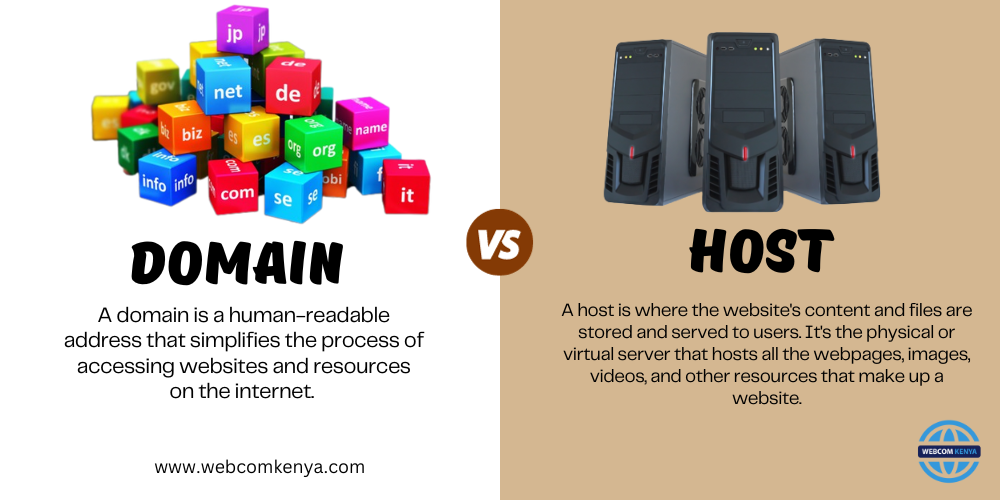difference between a domain and a host
What is the difference between a domain and a host?
Understanding the Difference between a Domain and a Host
In the world of the internet and website management, two fundamental concepts often confuse newcomers: domains and hosts. While they are closely related, they serve distinct purposes in the functioning of websites and the broader online ecosystem. To demystify these terms, let’s explore the key differences between a domain and a host.
 What is a Domain?
What is a Domain?
A domain is a human-readable address that simplifies the process of accessing websites and resources on the internet. Think of it as the online equivalent of a home address. Just as your home address helps people find your physical location, a domain helps users find a particular website or online service.
Here are some key characteristics of domains:
Human-Readable: Domains are composed of letters, numbers, and hyphens (although hyphens are typically discouraged) that form a web address, like www.example.com. They are designed to be easy for people to remember and type.
- Top-Level Domain (TLD): The last part of a domain, such as .com, .co.ke, .org, .net, .edu, or .gov, is known as the TLD. TLDs categorize domains into different groups, like commercial (.com), nonprofit (.org), network providers (.net), and more.
- Registered: Domains need to be registered through domain registrars, which are accredited organizations that manage and assign domain names. Domain registrations typically come with a yearly fee.
- Unique: Each domain is unique, and no two websites can have the same domain name. This uniqueness is crucial to ensure that when you enter a domain in your browser, it leads to the intended website.
- Alias: Domains can serve as aliases for more complex IP addresses, making it easier for users to access websites without needing to remember numerical IP addresses.
In summary, a domain serves as a user-friendly, human-readable address for websites on the internet, helping individuals navigate the vast online landscape.
What is web Hosting?
While a domain is like an address, a host is where the website’s content and files are stored and served to users. It’s the physical or virtual server that hosts all the webpages, images, videos, and other resources that make up a website. A host is responsible for processing user requests, retrieving the necessary files, and delivering them to the user’s browser.
Here are some key characteristics of hosts:
- Server: A host can be a physical server located in a data center or a virtual server running on a cloud platform. It’s a computer system dedicated to handling website data and user requests.
- IP Address: Each host has a unique IP address, which is a series of numbers that identifies its location on the internet. Domains are mapped to these IP addresses, ensuring that when you enter a domain in your browser, it connects to the correct host.
- Resources: Hosts store all the files and data that make up a website, including HTML documents, images, videos, databases, and more. When you visit a website, your browser communicates with the host to retrieve these resources.
- Performance: The quality and performance of a host can significantly impact a website’s speed, reliability, and uptime. Website owners often choose hosting providers based on their specific needs, such as shared hosting, virtual private servers (VPS), or dedicated hosting.
In essence, a host is the technical backbone of a website, responsible for storing and delivering its content to visitors.
The Relationship between Domains and Hosts
Now that we’ve defined domains and hosts, it’s essential to understand how they work together. When you type a domain name (e.g., www.webcomkenya.com) into your web browser, the Domain Name System (DNS) translates it into the corresponding IP address of the hosting server where the website’s content is stored. The browser then communicates with that server to retrieve the necessary resources and display the website to you.
In summary, a domain acts as the user-friendly web address that you enter into your browser, while the host is the server that stores and serves the website’s content. Both are integral parts of the web ecosystem, working in tandem to make websites accessible on the internet.
Conclusion
In the digital age, understanding the difference between a domain and a host is essential for anyone looking to establish a presence on the internet. Domains provide the user-friendly addresses that simplify website access, while hosts store and serve the website’s content. By grasping the roles of these two elements, you can navigate the online world more confidently and make informed decisions when creating and managing your web presence.
For more updates and insights, follow us on Facebook @webcomcloud.

 What is a Domain?
What is a Domain?